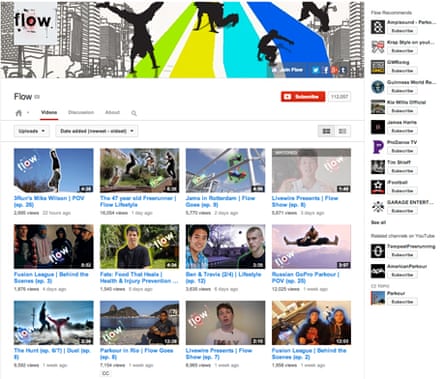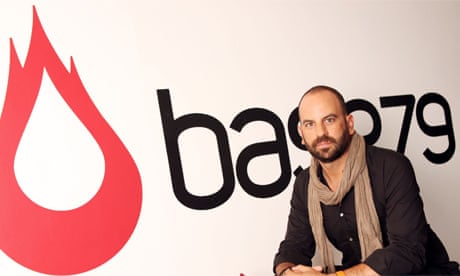As YouTube's senior director of content partnerships, Patrick Walker was one of the video service's key public faces for its dealings with the creative and media industries, as well as with multi-channel networks (MCNs) and individual creators.
Now he's trying life on the other side of the fence, joining UK-based MCN Base79 as its chief content officer nine months after the company – founded in 2007 by Ashley MacKenzie, son of Kelvin – raised $10m in a funding round.
The investment and appointment of Walker show big ambitions for Base79, whose 800 YouTube channels currently generate more than 650m monthly views, and which has partnerships with the likes of BBC Worldwide, Endemol's Tiger Aspect, Hat Trick Productions and The FA.
For Walker, it's a return to content production, where he started his career in 1993 as a producer and director for Japanese broadcaster NHK, before moving to the BBC as a senior broadcast journalist and senior producer.
"Thinking about technology challenges in relation to content creation was always something that fascinated me," says Walker.
"There's been a continuum to my career, of looking for a new exciting opportunity to take something that's still quite unformed, and help piece it together."
YouTube scenery
Walker certainly did that as Google's first hire outside the US to work on its video strategy, initially with Google Video and then as YouTube's European boss after the site was acquired for $1.65bn in 2006.
Walker found himself attending TV and media industry conferences at a time when YouTube was still viewed with suspicion by broadcasters and producers, not least because of copyright infringement concerns.
"It was a very tense time, with all the legal issues coming up. But over time, YouTube has become part of the scenery in television: it's a place you need to play at some level, in some way," he says.
"You've had the emergence of these brands – the MCNs – managing multiple channels on YouTube, and now a lot of the major media brands are getting engaged. But the big media companies are dipping their toes in still, which leaves a lot of room for an emerging company like Base79 to really establish itself."
Walker says he took a close personal interest in following Base79's growth while working at YouTube (and, indeed, he also invested in the company and joined its board in 2008 while working at YouTube).
"They're respected by rights holders, have a good reputation as content creators, and are seen as a safe pair of hands in dealing with these complex issues in a complex world," he says.
"In their DNA, they're truly a digital media company built for future expansion based on how people will consume video, and how advertising should be built into these multi-channel environments."
Walker suggests his role is about helping Base79 to "place its bets carefully" as YouTube continues to grow. The service currently attracts more than 1 billion unique monthly users who watch more than 6bn hours of video, with more than 1m channel-owners earning money from their content.
Base79 was one of the European launch partners for YouTube's Original Channels initiative in October 2012, securing funding for four channels with partners IMG, Guinness World Records and Hat Trick.
Walker says original content and partnerships with existing media firms will continue to be important, but adds that Base79's "bets" also include careful planning of its global expansion.
"It's about being a truly international company, as opposed to being 'global' just because your content is global," he says. "We're deciding where to place our bets with regard to regions emerging where we could use people in the ground."

Sustainable MCNs
YouTube and MCNs is an interesting subject in 2013. The rapid growth (in views and subscribers) of companies like Machinima, Maker Studios, Fullscreen and Base79 has fuelled bullish talk of TV disruption, gatekeeper disintermediation and monster revenues all round.
If you follow the sector more closely, though, you'll see more uncertainty: questions about whether the ad revenues on YouTube are as high as the MCNs expected – and, indeed, budgeted for when spending their Original Channels funding.
They're disruptive for sure, but how many YouTube-based businesses are sustainable for the long-term? "I would say it's an important time for people to stay the course," says Walker.
"The economics are still to be proven in many cases, so you have to get the right mix of production costs commensurate with the type of income you're going to generate. It's a good time to stay focused on the goal."
Walker notes the trend for some existing media stars – Jamie Oliver in particular – to use YouTube as a way to build direct-to-fan relationships while also bringing through new talent, as a positive thing.
He also suggests that coverage of channels struggling to make ends meet after blowing through their Original Channels funding may be missing the point, too.
"The Original Channels programming budgets were not meant to be long-term sustainable funds to draw on indefinitely. They were meant to seed the market, get excitement going and get people trying things they might not have done otherwise without that excitement and investment," says Walker.
"It served its purpose in that regard. People got excited, and there is now a lot of money coming in to developing businesses like Base79 who are figuring out how to create sustainable businesses on the platform, and stay at it."
Beyond YouTube
There has been speculation in recent months about some MCNs looking beyond YouTube for distribution of their videos, in an effort to boost views (and thus ad revenues) while reducing their reliance on a single platform.
Is Base79 considering this strategy? Walker points out that it's been doing that for a long time, distributing across various services, even though YouTube's growth made it the dominant channel.
"I think every multi-channel network would be wise to continually focus on how they serve creators not only on YouTube, but through different means of distribution and channels," he says.
Walker mentions connected TV apps as one opportunity of interest, and is also enthusiastic about the role mobile devices are playing in the growth of YouTube (and thus its content partners).
"Mobile is the fastest-growing category of usage. YouTube's mobile consumption is up to 50% or more in countries like Korea, and over 25% in the US and UK," he says.
"That's why it's important for Base79 to communicate to the partners we work with – rights holders and brands – that rights clearances across platforms are critical. Content has to be as free to flow across devices as it is across borders."

Comments (…)
Sign in or create your Guardian account to join the discussion